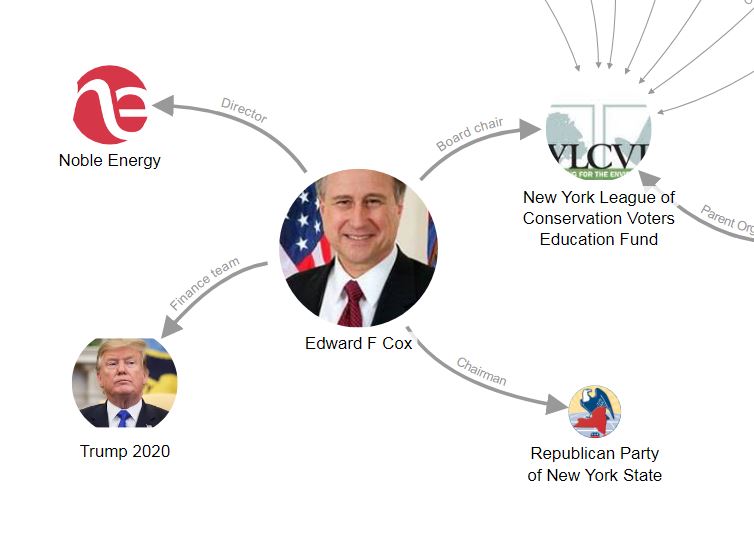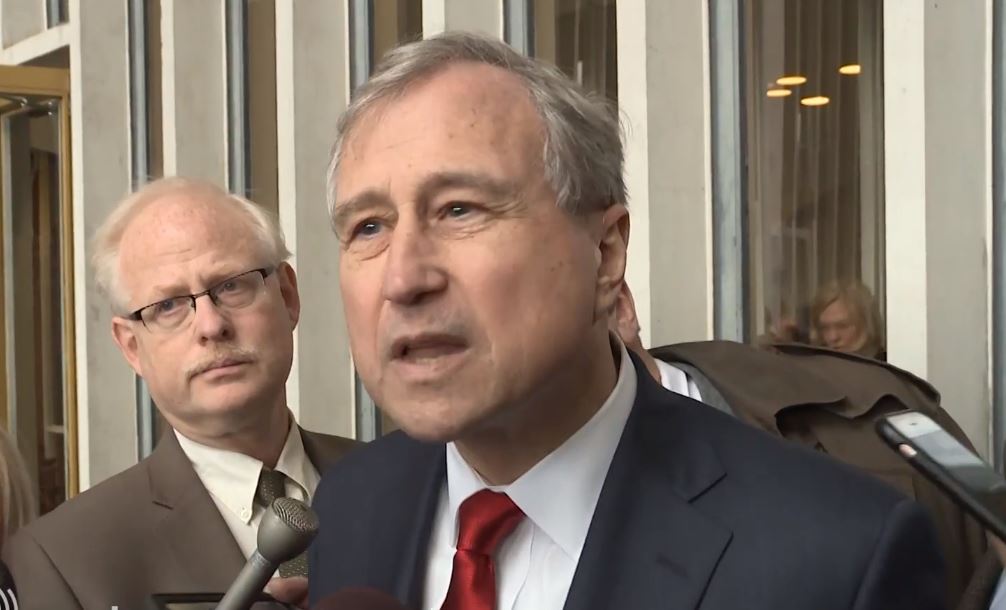Ed Cox speaking to reporters in 2017 (Source: Youtube)
In the face of a growing opposition to his leadership, Ed Cox is stepping back as chairman of the New York State GOP, a position he’s held since 2009. Erie County Republican head Nick Langworthy will likely take over Cox’s position as state party chair.
According to the New York Times, Cox will move on to join the Trump campaign finance team. “New York State can play a role in re-electing President Trump,” Cox announced at a Tuesday news conference.
Cox’s decision to join and raise money for Trump’s reelection effort deepens a major conflict of interest he holds.
Cox is the chair of the New York League of Conservation Voters Education Fund. The NYLCVEF is the public engagement wing of the New York League of Conservation Voters, a high-profile conservationist organization that receives backing from prominent figures in business and high society and is influential in state elections. The NYLCVEF’s mission is to “educate, engage and empower New Yorkers to be effective advocates on behalf of the environment — from clean energy and funding for parks, to solid waste and green buildings.”
But by actively joining the effort to re-elect Trump, Cox is pursuing a goal that appears to fly in the face of the NYLCV’s purported environmental agenda. The Trump administration has declared open war on our climate, gutting environmental regulations, promoting coal, expanding drilling rights, and pulling the U.S. out of the Paris Agreement, among other things. If Cox is successful in helping to reelect Trump, it will spell further disaster for the environment and make addressing our global climate crisis much more difficult.
Cox’s decision to help get Trump re-elected, as well as his and the NYLCV’s other fossil fuel industry ties discussed below, appear to confirm the skepticism by many in the climate movement that the NYLCV – and similar corporate-aligned conservationist groups – offer green cover to the oil and gas industry to pursue its main business of profiting off of fossil fuels.
Ed Cox and Noble Energy
Cox’s ties to the Republican Party – a party that contains climate crisis deniers and fossil fuel industry allies – and his new role in the Trump re-election campaign only intensify a preexisting conflict of interest that he holds as a leader within the NYLCV.
Cox has been a board member of Noble Energy since 1984, a top oil producer in the Texas Permian Basin, the world’s busiest oil field.
As a director with Noble, Cox has raked in millions of dollars. In the last five years alone, he has been compensated with over $1.575 million in cash and stocks awards for his board position.

It is unclear how Cox and the NYLCV rationalize the clear conflict between Cox’s governing position with – and personal profiting from – the fossil fuel operations of a major oil and gas corporate behemoth and his leadership position in a prominent conservationist organization.
NY League of Conservation Voters conflicts regarding the fossil fuel industry
We covered the conflicts of interest found in the sponsorship and leadership of the NYLCV last year in our article about the group’s 2018 gala, which was backed by major fossil fuel companies and honored Andy Sabin, a pro-fracking billionaire who is hostile to environmental regulation, has donated hundreds of thousands of dollars to Trump, and whose philanthropic foundation, we revealed, invests in numerous oil and gas companies.
At the time of last year’s gala, the NYLCVEF has several “Eco-Partners” that included prominent oil and gas companies with major business in New York State. These included Williams, Millennium Pipeline, NRG, and CSX.
In particular, the sponsorship of the NYLCVEF by Millenium and Williams is in conflict with widely-held aims of the environmental movement in New York State to stop fossil fuel projects being advanced by these two companies.
Climate organizers across New York State have mobilized to stop Williams’s proposed “Keystone-like” Northeast Supply Enhancement fracked-gas pipeline (state regulators rejected the $1 billion pipeline earlier this month – a victory for environmentalists but a blow to the NYLCVEF’s corporate sponsor).
Millennium Pipeline owns the Valley Lateral Project, which services the CPV Valley Energy Center with fracked gas. Climate activists fought unsuccessfully to stop the construction of both the pipeline and the CPV plant.
At the time of last year’s gala, the NYLCV had several board members who worked for Millennium Pipeline, including a Millenium attorney, public relations manager, and lobbyist.
As New York State environmentalists seek to stop the build out of new fossil fuel infrastructure, the fights around the Williams pipeline, the Millennium pipeline, and the CPV plant have been central campaigns over the past few years. But the NYLCV appears to have been entirely silent about all of them.
The NYLCVEF’s has now removed its “Eco-Partners” page and replaced it with the title “Corporate Partners.” Williams, Millennium Pipeline, and CSX are still listed as NYLCVEF Corporate Partners, as are Exxon, Entergy, Con Edison, National Grid, and Suez, a water company that profits from business with the fracking industry.

All this raises longer-standing concerns, which we have examined in the past, that the primary role of these kinds of corporate-backed environmental groups is to provide green cover for the fossil fuel industry. Through sponsorships and gala appearances, fossil fuel companies are able to “greenwash” their image – to present an appearance of concern for the environment even as their primary business, which they seek to expand, remains tied to extracting, selling, and burning fossil fuels, and thereby deepening our climate crisis.
Receiving sponsorship from the fossil fuel industry, and giving leadership positions to individuals that profit off of fossil fuel operations, stands in stark tension with the unhampered ability by an organization to challenge the driving force of our global climate crisis – that same fossil fuel industry.
